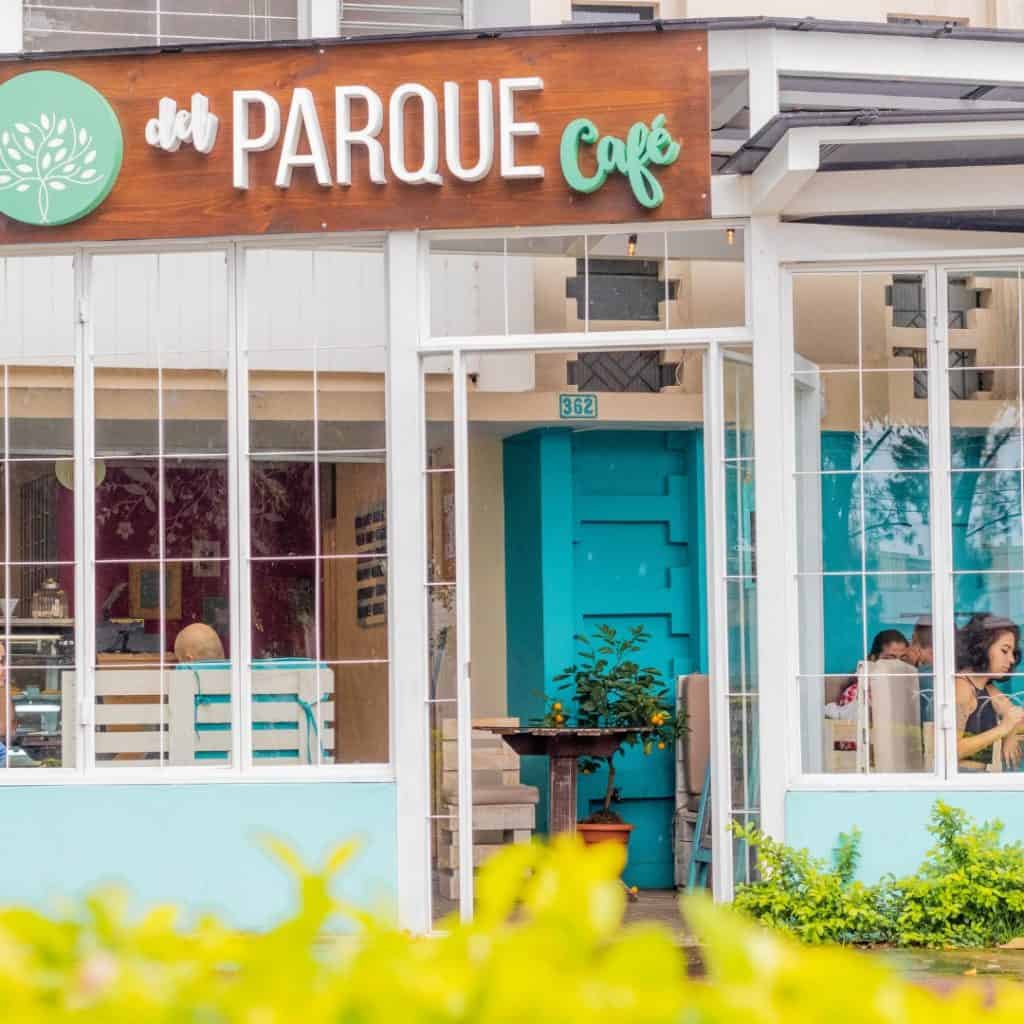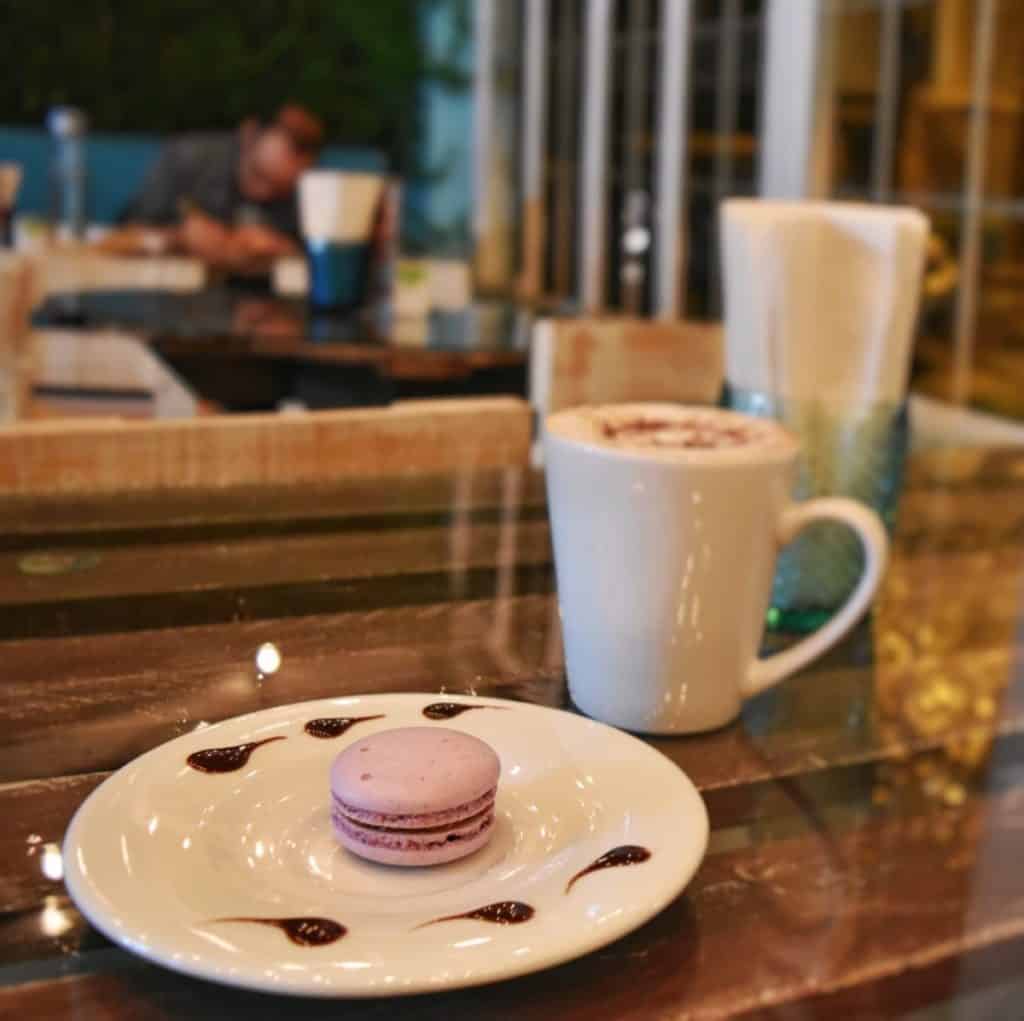
Del Parque Bistro. At the beginning it was called Del Parque Cafe
There is a saying that goes: it is not the same to watch her dance as to dance with her. This is definitely true for running a coffee shop. You can prepare and read a lot but you will never really know how hard or easy it is until you give yourself a shot.
From our experience, it is hard to run a coffee shop. There are many factors that make it hard like the financial risks, the mental and emotional endurance and resilience needed, the uncertainty of sales, the relation with employees, the need to constantly satisfy customers, and be vulnerable to comments on social media while trying to make a profit.
There are however also very satisfying and rewarding benefits like the possibility to serve quality coffee and food, give employment to people, give customers a space for the enjoyment of life, be your own boss and eventually gain profit.
So I would say it may not be hard but harder than you can expect in the planning phases.
As coffee shop owners we just want to be honest about our experience and hope that this will be of service to other people looking to have their own coffee shop. Our experience may not be the same as other coffee shop owners, but it is a dose of reality that I wish someone would have told me when I was considering opening up our coffee shop, I believe it could have made the journey a little less painful.
Read along this post to go further in-depth into all these reasons and more.
The entrepreneur rollercoaster
During the years of our coffee shop, I’ve come to realize that my emotions towards the project have being in many cases tied up to how sales are going. When I have a good sales day I feel great and motivated. I feel like my business is worth it and the coffee shop will thrive.
But the contrary also happens. When I have a bad sales day or a particular event does not turn out how I planned, I feel discouraged, unmotivated, and more pessimistic about the business.
I guess this is normal, but you sort of need to develop hard skin toward wins and failures; as well as try to recognize when you are going through these ups and downs. It is okay to feel emotions, but you can not judge the performance of your coffee shop based on highs and lows. You must analyze the trends.
Are sales moving on an upward or downward trend through the weeks and months? Are you getting more frequent customers, is the number of people entering your coffee shop improving over time?
It is important to know these numbers so you can have peace of mind and get some objectivity to your emotions. They give you an objective view of whether your business is going on a positive route or not, or somewhere in the middle. It could be that things are going okay but there are things to adjust.
Also, there is a seasonality that can affect sales. It may not be the same amount of sales that you get during the summer as the winter, during the sunny season or rainy season. This is also the same for the end of the month versus the beginning when people get paid. There are other external factors that come into play and affect sales. You must definitely not get too emotional about it or else it makes it really hard to run a coffee shop, for you will be on a constant rollercoaster.
I heard this concept first being mentioned by Darren Hardy: the entrepreneur rollercoaster. I believe it is a great way to describe what goes on in the life of a coffee shop owner.
Like all business, there are risks involved

When you work at a corporate job you get your paycheck every month or twice a month. Of course, there is always the risk of getting fired, which actually was part of the reasons for setting up the coffee shop in the first place. But in your day to day on a corporate job, you generally do not have to worry about whether or not you will get your payment at the end of the month.
When owing your coffee shop you do not have this certainty. First, sales are not guaranteed and neither is income. You are vulnerable to changes in climate, events, and consumer behavior. Every time it starts to rain I get nervous about that day’s sales. Also, when there are other events in town like a fair I know that probably my sales will drop for that day because people will move away from my coffee shop to attend the event.
If you do not work and move your sales you do not receive money, simple as that. Even sometimes you will not only not sale but you may also loose ingredients because they exceeded their life span and need to be discarded. You may also have prepared certain food for a particular event and people did not show up as expected. This is money that goes down the drain.
Also, when calculating your margins for your foods, there are some items that have a higher cost in electricity then you would think. The net or brut profit may not be the one you calculated, it can be higher or lower. This also adds risk to your business for sometimes it is not so clear what your true costs for producing certain items are.
All this uncertainty and vulnerability to variables that can not be fully controlled by the owner add risks to the business. And for this, you must also have a mental endurance.
Financial sacrifices
You may sometimes feel like you are working to pay other people’s salaries as well as your suppliers. You may feel like you are the last on a chain of payments, and you will receive your income only if everyone else is first satisfied. This can be a hard aspect to swallow.
When dreaming of having your own coffee shop some of the reasons for doing so may be to own your time, be your own boss be free to make decisions.
When you actually own a coffee shop you may find yourself to be the last one to gain profit, the one to have less time and having to make decisions all the time.
You may be lucky and have some great employees that will have your back no matter what, but the truth is that most of your time you will be the one worried about making the business thrive and the rest expecting to receive their monthly payment.
So you will most definitely be making a financial sacrifice, especially at the beginning of your project. After some years you will probably start making sustainable money but the journey can be hard and feel really slow.
Having a coffee shop you definitely need to have the capital to be able to withhold for at least a year if not more, without making a profit. This means that the business will probably not be able to make it on its own financially speaking, and you will need extra money to keep it afloat and be able to pay rent, employee wages, electricity and services, as well as buy food items.
You may be spending your life savings or sacrificing activities or even education for your family. If you have a loan, you may endure stress over being able to pay the bank while trying to have a cold mind to be able to make strategic objective decisions.
This is probably one of of the most difficult aspects of running a coffee shop, being okay with sacrificing your finances for a while with a journey ahead and a final end in mind.
Employee engagement
There is another saying that goes:
The master’s watchful eye fattens the cattle
This is one of the biggest challenges when having a coffee shop: the engagement with your employees. I believe having employees with outstanding performance is a mixture of your leadership skills, training, and mentoring, but also a little bit of luck with the person you hire.
With employees, you may need to have a system of reward versus punishment. Combined with one where you share your risks of sales, or even better your risk of profit.
I believe it is very important to have a remuneration system that shares risk with employees.
I have no doubt that when you have a fixed payment, no matter how much sales you have, they will feel no pain. If it rains or simply customers did not show up a certain week you still have to pay the same amount to employees, But if you have a system where you share risk then you have them more motivated to assist each customer better, to make more sales, to have recurrent customers.
Also, they are usually efficient in finding problems to solve, but not so much solving them.
For example, fixing a loose sign, or asking for gas. It happened that the administrator had the supplier contact. One would expect employees to call the supplier and ask for gas, but instead, they raise the flag saying there is no gas. This seemingly simple problem/solution happens all the time.
Another example would be with raw materials. As a coffee shop owner, you wish to maximize profits and minimize waste. But it was not uncommon for employees to waste your premium coffee without much worry. When they made the espresso, they would just over grind and throw away the excess. When doing the math there was money with every gram of specialty-coffee thrown away without any real reason to do so.
As a coffee shop owner, you feel like they just don’t care or realize that from the profit of the business derives their salary. It can be frustrating.
There may be an issue related to empowerment, mentoring, and leadership from you as an owner, I agree. But also, sometimes employees do not meet your expectations, even though when hired you may have clearly established with them what does expectations were.
Be prepared to be constantly disappointed by employees. In the end, it is not their business, it is yours. And nobody will treat it the same as you as an owner. Of course, there can be exceptions and you can also be surprised at times. But I would say it is not the general rule. Sometimes you may have to compromise expectations and again be patient, be persistent, have the end goal in mind, and try to enjoy the journey.
Low price high volume sale items
In a coffee shop, you usually need to sell a lot of coffee to be able to make a high amount of sales. Coffee is a low priced item, compared to other food items like the ones served in restaurants. So you need a high sales volume. With high volume comes more staff needed to keep up with that volume, and hence the costs and wages go up.
So it is kind of a vicious cycle: more sales volume, more costs, then more sales volume again. With more sales volume it is also more difficult to keep up with great quality of food and service, so you can become more vulnerable to dissatisfaction from customers and hence bad reviews.
When you first start your business, the sales you estimate prior to opening are usually higher than the reality. When you start your coffee shop this is something that slaps you in the face. You have to be patient.
Customers may not suddenly start to flush in. But little by little, you will start to build an audience. This little by little journey can be tough though. Again you must be resilient, patient, and have the long term vision constantly in your head. Otherwise you may want to quit and run. A coffee shop is definitely not a get rich quick skim.
You may also want to read: Gross profit for a cup of coffee
Clients and social media
Clients can be very grateful and joyful to provide service to. But they can also be even mean. And especially these days with social media, it is not uncommon for an unsatisfied customer to complain about it on social media giving you really bad advertising.
Some customers complain and they like to do so publicly. Sometimes you may think they are right and sometimes wrong, but each time they public you will feel like you are taken a beat down.
It is so disheartening to make an effort to satisfy your customer and then see his or her complaint on social media. You feel so vulnerable and even worried about how it will negatively impact your business.
With time you will learn that this is just part of the whole game. Try to take advantage of this type of post to learn, to get better, to bring it to the conscious of your employees, but do not fuzz too much about it, for it will not be the first nor the last time it happens.
Also, try to respond to the customer complaint on social media, I believe sometimes when done right it can even be beneficial for your business.
Specialty customers are usually very demanding in quality. They can be very grateful if you deliver great quality, but can also be harsh if their standards are not met. And with coffee shops, it happens a lot.
It is not just the coffee they are after, it is an experience. Customers may expect to be able to engage with the coffee shop, to relax or concentrate or spend time with friends or family.
With this expectation usually comes the desire for great service and quality, and if this is not met they can be disappointed and harsh. There is a relation between the expected value and return for your money, I believe with a coffee shop you expect a lot for what you pay for. Be ready for this.
Coffee shop owner lifestyle
Especially at the beginning of your journey as a coffee shop owner you will probably be spending many hours at your coffee shop. When not working directly attending customers you will need to organize other duties like paying salaries, ordering supplies, determining promotions. It is a never-ending list of tasks.
You will probably dedicate many more hours as you would at a corporate job. And you may not have a 9 to 5 schedule, but may start early in the morning and leave late at night depending on the open hours for your coffee shop.
Especially at the beginning, it is highly important that you supervise the work of your employees. That you observe how your strategy is implemented on the floor. How your customers react. How the quality of the food is. How the service is. There are many reasons to be on your coffee shop all the time assuming you are not part of the attending staff.
Also, when starting you may not have the money to pay for full salaries, so it may be the case that you need to be one of the people serving the customers. If this happens be careful not to lose sight if your business.
When you are inside it can be common for you to get so carried away by the daily tasks that you loose sight of seeing things from an outside and more strategic perspective. This is important in order to understand what areas of your business are doing okay and wich need improvement.
Finally, it is not uncommon for employees to get sick or not be able to show up for work. When this happens, if you do not have a backup plan, you may be the one substituting your employee’s shift. Guess when this happens? Anytime: weekends, nights, you guessed it.
So suddenly, the freedom of time you envisioned may not be so.
Emergencies
It is most likely that you as a coffee shop owner will have to deal with “emergencies” all of the time. And I say it under quotes because there are things that are not really an emergency but do seem so at the time.
From a leaking faucet to an angry customer, to an oven not working, or an espresso machine with a sudden deviation. There are just lots and lots of tiny little things that may take away the time of the day.
The thing with being a coffee shop owner, is that most of the time there is no one else but yourself to get things solved. Whilst with a “regular job” you may have a specific duty or task, in general speaking of course, when owning a coffee shop you really have to know a little bit about a lot of things.
Dealing with “emergencies” will just become a part of your life and these tiny problems will appear at any time, with no respect for your free hours away from the shop, or while spending time with your family.
So it is hard and you have to get accustomed to this, but you can also train and empower your employees so that they can handle things. Also, when problems arise, you should try to learn from the experience and start to for a database of problems and solutions, so that in the event that they should rise again, the employees know how to handle them.
One example of this would be fixing the espresso machine. Employees should know about basic maintenance and go through a revision protocol before calling you or the technician.
Another example would be discounted or add ons for products. If you establish clear rules for some common situations like for example customers’ special requests or discounts then you may be able to reduce having to be on hold constantly.
If it is hard then why do it
Like I said at the beginning of this article, it is hard to run a coffee shop. But it can also be very satisfying.
What I am trying to communicate with this article is that you will definitely have your challenges as a coffee shop owner, and there is only so much you can do to prepare yourself for it.
But one simple thing that can really help is to acknowledge that if these situations arise you are not the only one that have gone through them, you are not a bad business person and it does not mean that your business will not thrive.
It is just part of the journey, and with this in mind try to recognize it as it is, a small bump on the road to having a great awesome coffee shop.



